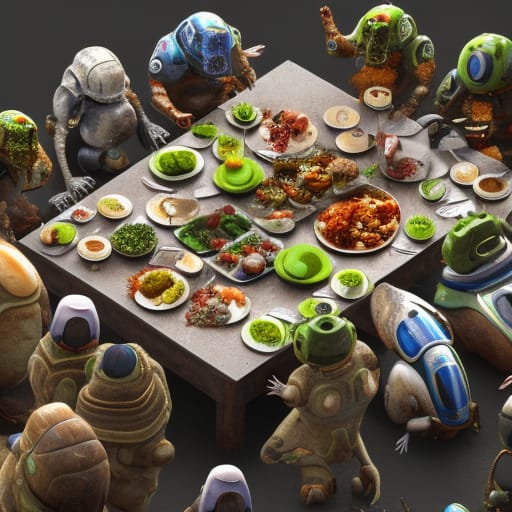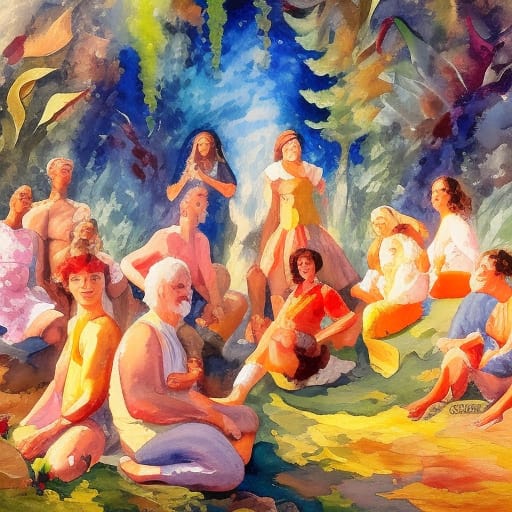Of gatherings and magic
Rethinking what it means to "live together".

Regardless of where you come from or what you believe in, religion has always done one thing right, creating a sense of community.
Personal beliefs aside, I've always been amazed at how communities and cultures develop and blossom around a shared belief. Sports are a good second best, but no other has brought people together quite like religion. Whole towns, cities, states, nations, have been created under such a shared belief, and within them cultures grew. People exchanged ideas around a shared constant and as the gathering grew, so did the bonds, which reinforced the belief.
Certainly, on a small scale we've all experienced the formation of a community, whether it be work, a hobby, recreational activity, hanging out in the neighborhood, etc. where a sense of "oneness" can be harvested. Not in the sense that all ones are the same, but that all ones bring a unique aspect to a shared experience that provides them with a sense of belonging. These people are now your people, and as such, you belong to them.
The constant behind all of these is time in a shared space.... and a willingness to be there.
I've eluded to this in another post that social media has helped people branch out and discover new communities that fit with them in a much better way. The cost for this enhanced communication and outreach is the fracturing of local communities and a disengagement of local life. Why be engaged at the local level when you be more easily be with people that *get* you? I certainly can't blame anyone for wanting to do that. However, I do wonder at what risk of neglect do we leave our local communities without some way to tie everyone together. Religion has done this to great effect, but always with the risk of single-mindedness. Sports, the runner up, fosters a divisive atmosphere. However, there is something people are always happy to bond over, the need to eat.

The Shared Community:
In the last blog, Post Food Scarcity, I made reference to community kitchens, a place where locals (and occasionally travelers) can gather to share food with the company of others. It's a place where majority of the communal food can be stored, prepared, and served. These kitchens aren't meant as a replacement for your own personal kitchen & pantry, but it does help with the need for each household to have such a large kitchen. Instead of having redundant appliances strewn across every household within a close community, most of those items can be easily stored, accessed, and shared within a central gathering place for the community. Effectively freeing up living space within a dwelling and/or reducing the amount of space that is needed for your own personal habitat.
Along the same vein as the community kitchen, there are other redundant features built into housing that could or would be much better utilized within a shared community space. Guest rooms, laundry rooms, home gyms, workshops, storage areas, parking garages, or any room dedicated solely to entertaining a crowd could all be built into the community center. Given that this area will be comprised of communal spaces that are shared for the greater good there is a built-in incentive to ensure that the property is not only properly maintained but also infused with the local flavor of the community. Each center can be as unique as the community would like it to be.
In addition to consolidating these features within a shared space, there are a few side-effects from this that could bring about a positive change to how communities are structured.
First is that there is no longer a need to build large single-family homes:
- Having your own personal space is important. From a mental health aspect, everyone needs space for them to be *them*. However, there isn't a need for all of us to exist within our own self-sustaining life pod. Not everyone has to acquire the same set of essentials that everyone else requires to sustain themselves. Through having a communal area it's easier to build more "living" space. Areas of greater self-expression. A chance for "deeper" personal space.
Second effect is that land can be more effectively managed:
- The community can self-govern how densely these spaces need to be built based on resources available, the local terrain, and the active-ness of the residents. Large lots of land wouldn't be a necessity that couldn't be better shared with others. And neither is the need to stack people on top of each other. Each community is going to shape out differently but that adds to the greater mystique of the world. If anything, it's more reason to get out to travel.
Living with a smaller footprint is the third:
- Not just in the sense that there is less need to manufacture these shared goods, but also in the fact that there will be a shift in producing for quantity to producing for quality. With many minds sharing the same appliances, there will come a need for that appliance to meet a multitude of needs. And meet them well. Custom, on-demand manufacturing would begin to prevail over the need to produce a large amount of goods to maximize profits, as it'll become harder to find a "one size fits all" approach to every community.

Bringing it all together:
There is no one way to build a community. No way of knowing what a pre-planned, mapped out, by-the-books version of what a good working community looks like. There are some shared basic needs that can be planned for, but how those needs are met will be dictated by those doing the work. Each area will be unique. Each combination of factors derives a different result. Remembering to include the diverse backgrounds of the population into the setting will help set each location apart. All things will be balanced by how the community can best serve its residents, and how the residents can best serve their community. There will always be problems and cooperation is not guaranteed. How that affects life adds to the dynamic and really ties it all together.
Well that = that. One thing that keeps me excited about writing is getting the chance to explore the various areas of the world and find out what makes each setting more interesting and unique from the others. How do you think this type of community would pan out? Would love to hear any questions, feedback, encouragement, etc. that you may have so feel free to reach out! Also, please subscribe to the mailing list if you haven't already. It's the best way to stay up to date with the latest posts and any book updates that I may have.
Thanks for reading! :)
